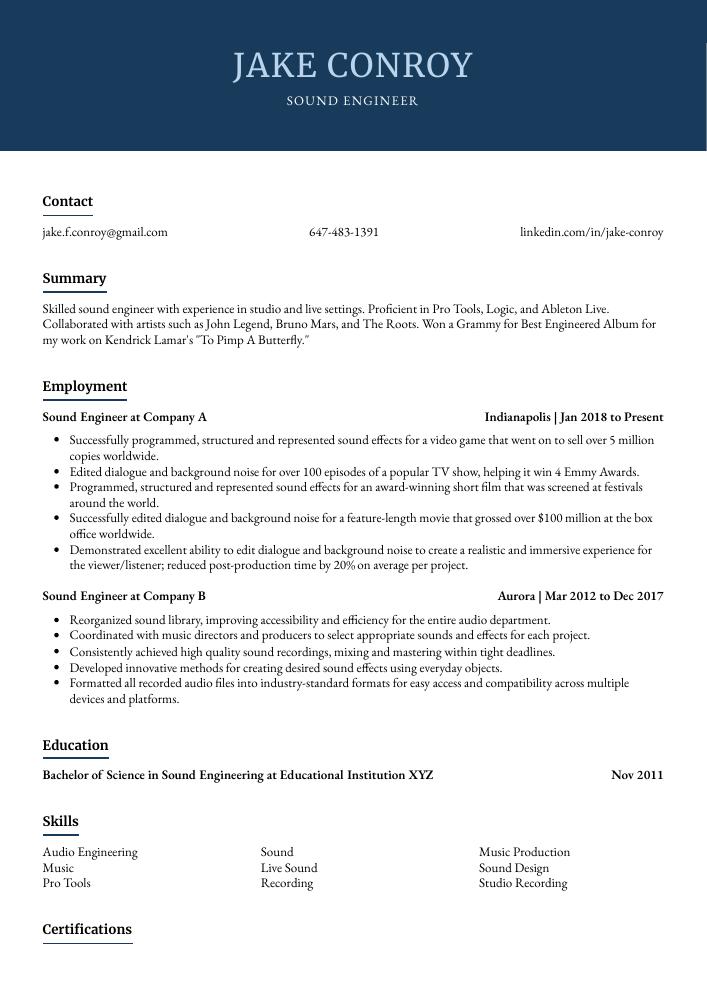Sound Engineer Resume Guide
The main responsibility of sound engineers is to operate and maintain the equipment used to record, amplify, mix, or reproduce sounds. This can include working with live music performances and recording dialogue for movies and television. They may also work in post-production to create sound effects for movies and video games.
Your passion for music comes through in your work as a sound engineer. But hiring managers at recording studios don’t know who you are or what you can do. Write a resume that highlights your skills and experience to get their attention.
This guide will walk you through the entire process of creating a top-notch resume. We first show you a complete example and then break down what each resume section should look like.
Table of Contents
The guide is divided into sections for your convenience. You can read it from beginning to end or use the table of contents below to jump to a specific part.
Sound Engineer Resume Sample
Jake Conroy
Sound Engineer
[email protected]
647-483-1391
linkedin.com/in/jake-conroy
Summary
Driven sound engineer with 6+ years of experience in live sound reinforcement and studio recording. Proven ability to operate and maintain audio equipment, as well as mix various live music genres for large audiences. Seeking to join the team at ABC Studios to share my passion for music and audio engineering while collaborating with other like-minded professionals.
Experience
Sound Engineer, Company ABC
Indianapolis, Jan 2018 – Present
- Successfully programmed, structured and represented sound effects for a video game that went on to sell over 5 million copies worldwide.
- Edited dialogue and background noise for over 100 episodes of a popular TV show, helping it win 4 Emmy Awards.
- Programmed, structured and represented sound effects for an award-winning short film that was screened at festivals around the world.
- Successfully edited dialogue and background noise for a feature-length movie that grossed over $100 million at the box office worldwide.
- Demonstrated excellent ability to edit dialogue and background noise to create a realistic and immersive experience for the viewer/listener; reduced post-production time by 20% on average per project.
Sound Engineer, Company XYZ
Aurora, Mar 2012 – Dec 2017
- Reorganized sound library, improving accessibility and efficiency for the entire audio department.
- Coordinated with music directors and producers to select appropriate sounds and effects for each project.
- Consistently achieved high quality sound recordings, mixing and mastering within tight deadlines.
- Developed innovative methods for creating desired sound effects using everyday objects.
- Formatted all recorded audio files into industry-standard formats for easy access and compatibility across multiple devices and platforms.
Skills
- Audio Engineering
- Sound
- Music Production
- Music
- Live Sound
- Sound Design
- Pro Tools
- Recording
- Studio Recording
Education
Bachelor of Science in Sound Engineering
Educational Institution XYZ
Nov 2011
Certifications
Certified Audio Engineer
Audio Engineering Society
May 2017
1. Summary / Objective
A resume summary/objective for a sound engineer should highlight your experience and expertise in the field, as well as any special skills you have that make you an ideal candidate for the position.
Some examples of what could be included in a summary are: years of experience working with different types of audio equipment, familiarity with various recording software programs, and ability to work effectively under pressure.
Below are some resume summary examples:
Amicable sound engineer with expertise in mixing, live sound reinforcement, and post-production. Proven ability to work well under pressure and adapt quickly to change. At XYZ, responsible for the audio of over 100 events per year, including large festivals with up to 50,000 attendees. Recognized for being a quick learner and always putting the needs of clients first.
Passionate and experienced sound engineer with over 7 years of experience in live music and studio settings. Proven ability to operate a wide range of audio equipment and mix multiple tracks together seamlessly. Seeking to join the team at ABC Studios to provide high-quality sound recordings for their clients. In previous roles, increased client satisfaction by an average of 21% through providing clear instructions and offering suggestions on how to optimize the sound setup.
Well-rounded sound engineer with eight years of experience in live sound reinforcement and studio recording. Proven ability to mix FOH, monitor wedge, and in-ear mixes for up to 20 different instruments simultaneously. Experienced in setting up, tearing down, and maintaining PA systems for small clubs/venues and large arenas/stadiums. Additionally skilled in location scouting, stage managing, and artist relations.
Seasoned sound engineer with over a decade of experience working in live music venues and recording studios. Managed sound for an average of 4 to 6 events per week, including concerts, corporate functions, and wedding receptions. As the head audio technician at DEF Studios, increased business by 25% through exceptional customer service and repeat clientele.
Hard-working sound engineer with 4 years of experience in the music industry. Skilled at mixing, mastering, and recording various genres of music. Experienced in live sound engineering for concerts and events. At XYZ Music Festival, mixed front-of-house audio for 5 stages featuring over 30 acts per day. Seeking to join ABC Records as a sound engineer to contribute to the production of chart-topping hits.
Detail-oriented sound engineer with 7+ years of experience in live and studio settings. Managed up to 12 audio technicians and assistants while working on large-scale projects. In previous roles, increased client satisfaction by 17% due to prompt resolution of sound issues.
Proficient sound engineer with over 6 years of experience working in live sound reinforcement and studio recording. Experienced in both analogue and digital audio equipment. Extensive knowledge of Pro Tools, Logic Pro, Ableton Live, and various other DAWs. Seeking to leverage my skills and experience to contribute to the success of ABC’s audio department.
Accomplished sound engineer with over a decade of experience mixing, editing, and producing audio for live concerts and studio recordings. Proven ability to troubleshoot sound systems and optimize sound quality. At XYZ Music Festival, increased stage coverage by 15% while also reducing noise complaints by 32%.
2. Experience / Employment
In the experience section, you’ll detail your employment history. Write this section in reverse chronological order, which means listing your most recent job first.
Stick to bullet points for the majority of this section; they’re easier for the reader to scan and understand. When writing each bullet point, go into detail about what you did and any quantifiable results you achieved.
For example, instead of saying “Mixed different tracks together,” you could say, “Successfully mixed 100+ tracks per week for various music albums, using Pro Tools software.”
To write effective bullet points, begin with a strong verb or adverb. Industry specific verbs to use are:
- Recorded
- Edited
- Mixed
- Mastered
- Produced
- Engineered
- Arranged
- Composed
- Conducted
- Performed
- Sampled
- Programmed
- Sequenced
- Formatted
- Restored
Other general verbs you can use are:
- Achieved
- Advised
- Assessed
- Compiled
- Coordinated
- Demonstrated
- Developed
- Expedited
- Facilitated
- Formulated
- Improved
- Introduced
- Mentored
- Optimized
- Participated
- Prepared
- Presented
- Reduced
- Reorganized
- Represented
- Revised
- Spearheaded
- Streamlined
- Structured
- Utilized
Below are some example bullet points:
- Composed original music for film, TV and video games using a variety of software programs.
- Sequenced and mixed audio tracks for live performances, ensuring that sound levels were balanced and optimized.
- Competently operated mixing boards, digital recorders and other sound equipment during recordings and events.
- Streamlined post-production processes by creating efficient workflows and editing audio files quickly & accurately.
- Assessed clients’ needs and provided expert advice on choosing the right audio equipment for their budget & requirements.
- Mentored new sound engineers in the techniques and procedures of the studio.
- Demonstrated an excellent ear for music, able to identify instruments and tones with ease.
- Formulated innovative ways to mix different tracks together, creating a unique soundscape for each project.
- Revised older recordings to improve audio quality and remove background noise interference.
- Resourcefully utilised limited resources to create high-quality recordings on budget and ahead of schedule.
- Expedited the recording process by setting up and testing equipment before sessions, which saved an average of 2 hours per session.
- Recorded dialogue, sound effects and music for 16 episodes of a web series, ensuring that all audio was properly synced with the video footage.
- Improved sound quality in recorded dialogue by 10%, thanks to expert use of acoustic treatments and sound-absorbing materials in the recording studio.
- Meticulously logged all sounds used in each scene of a movie, which made it easier for the post-production team to edit the audio track.
- Optimized recording studio layout to reduce noise bleed between different instruments/vocalists, resulting in clearer recordings overall.
- Efficiently set up and operated sound equipment for live events, including concerts, conferences and theatre productions.
- Prepared detailed reports on the technical aspects of each event and submitted to the relevant production manager.
- Participated in post-event debriefs with clients to discuss areas of improvement for future bookings.
- Sampled a wide range of audio tracks to select the most suitable ones for specific events.
- Presented new ideas for improving the overall sound quality at live events.
- Introduced innovative sound equipment and recording techniques that improved audio quality by 25%.
- Arranged and conducted interviews with over 100 guests, celebrities and experts for various talk shows, podcasts and radio programs.
- Substantially reduced background noise levels in recordings by utilizing state-of-the-art soundproofing materials.
- Reduced post-production work hours by 10% on average through the use of automated editing software tools.
- Conducted extensive research on acoustics to optimize the sound design of live performance venues such as concert halls and theaters.
- Mastered the use of a wide range of sound engineering equipment and software to produce high-quality audio recordings.
- Compiled an extensive library of sound effects and music tracks, which were used in over 100 productions.
- Achieved consistently positive feedback from clients for the quality of audio recordings produced.
- Reliably met deadlines for all projects, often working long hours to ensure that client expectations were met or exceeded.
- Spearheaded the development of new recording techniques that improved the quality of audio recordings while reducing production costs by 20%.
- Facilitated the recording, mixing and mastering of over 100 songs for 5 different albums, ensuring that each met the required quality standards.
- Utilized a range of software programs to edit, mix and process audio recordings, as well as hardware devices such as microphones, soundboards and speakers.
- Accurately set up and operated technical equipment prior to performances and events, minimizing sound issues during live shows.
- Produced high-quality recorded materials by editing sounds using Pro Tools software; also restored damaged or corrupted audio files when necessary.
- Restored old vinyl records and cassette tapes by digitizing them and cleaning up the audio track; improved sound quality by at least 50%.
- Advised on-air talent and producers on the use of microphones, audio equipment and sound effects to enhance their broadcasts.
- Performed regular maintenance on all audio equipment, troubleshooting and resolving any issues that arose.
- Actively monitored recordings for sound quality, making adjustments as necessary to ensure a high level of fidelity.
- Mixed live broadcast signals from multiple sources using a digital mixing console, ensuring that each element could be clearly heard by listeners.
- Engineered complex sound systems for large events such as concerts and conventions, adjusting levels and EQs as needed to produce the desired effect.
3. Skills
Job skills requirements will differ from employer to employer – this can be ascertained by looking at the job posting. Some companies might require experience with a specific type of software, while others might place more emphasis on creative abilities.
As such, you want to tailor the skills section of your resume according to each job that you are applying for. This is essential because many employers use applicant tracking systems (computer programs that scan resumes for certain keywords before passing them on to a human).
In addition to just listing skills in this section, you should also expand upon the most important ones in other parts of your resume, such as the summary or experience sections.
Below is a list of common skills & terms:
- Audio Editing
- Audio Engineering
- Audio Post Production
- Composition
- Entertainment
- Live Events
- Live Sound
- Logic Pro
- Music
- Music Industry
- Music Production
- Post Production
- Pro Tools
- Professional Audio
- Recording
- Sound
- Sound Design
- Sound Editing
- Sound Reinforcement
- Studio Recording
4. Education
Including an education section on your resume will depend on how far along you are in your career. If you just graduated and have no work experience, your education should be mentioned below your resume objective. However, if you have significant work experience that is relevant to the sound engineer job you are applying for, then omitting an education section altogether is perfectly fine.
If including an education section, mention courses and subjects related to sound engineering such as “Sound Design,” “Audio Post-Production” and “Live Sound.”
Bachelor of Science in Sound Engineering
Educational Institution XYZ
Nov 2011
5. Certifications
Certifications are not always necessary, but they can prove to a potential employer that you have the skills required for the job.
If you have any relevant certifications, include them in this section of your resume. Be sure to list the name of the certifying organization and the date of certification.
Certified Audio Engineer
Audio Engineering Society
May 2017
6. Contact Info
Your name should be the first thing a reader sees when viewing your resume, so ensure its positioning is prominent. Your phone number should be written in the most commonly used format in your country/city/state, and your email address should be professional.
You can also choose to include a link to your LinkedIn profile, personal website, or other online platforms relevant to your industry.
Finally, name your resume file appropriately to help hiring managers; for Jake Conroy, this would be Jake-Conroy-resume.pdf or Jake-Conroy-resume.docx.
7. Cover Letter
Including a cover letter with your job application is becoming increasingly common. These letters provide an opportunity for you to elaborate on your skills and experience, and explain why you believe you are the best candidate for the role.
When writing a cover letter, keep it concise and focus on highlighting the most relevant information for the job at hand. If done well, a cover letter can give you a significant advantage over other candidates who have not taken the time to prepare one.
Below is an example cover letter:
Dear Adan,
I am writing to apply for the sound engineer position at XYZ Studios. With more than 10 years of experience in the music industry, I have the skills and knowledge to contribute to your team’s success.
As a sound engineer, I have worked on a variety of projects, from recording albums to mixing live shows. My experience has taught me how to troubleshoot technical problems quickly and efficiently. I am also an expert in Pro Tools and Logic Pro, which makes me confident that I can meet your expectations for this role.
In addition to my technical skills, I have excellent interpersonal skills that allow me to work well with other members of a production team. My positive attitude and willingness to take on new challenges are also strengths that would benefit your studio.
I believe that my combination of technical expertise and people skills make me the perfect candidate for this position. I look forward to discussing my qualifications further with you in person or over the phone at your earliest convenience. Thank you for your time and consideration.
Sincerely,
[Your name]
Sound Engineer Resume Templates
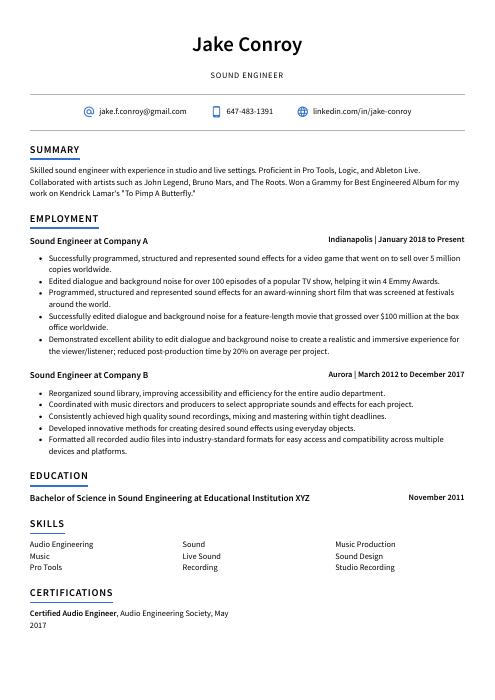 Axolotl
Axolotl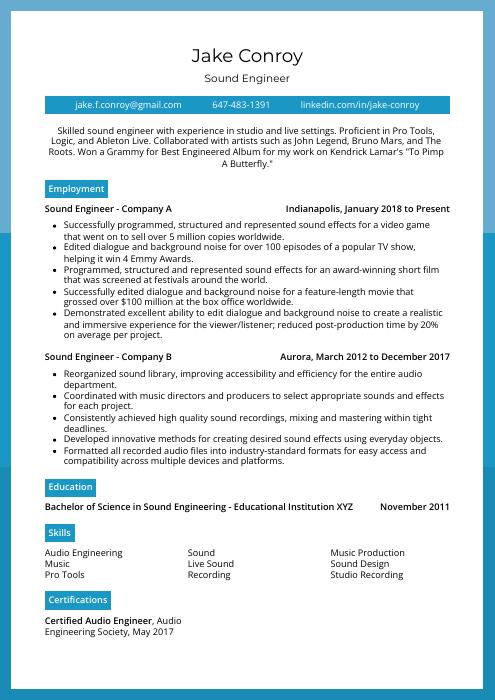 Rhea
Rhea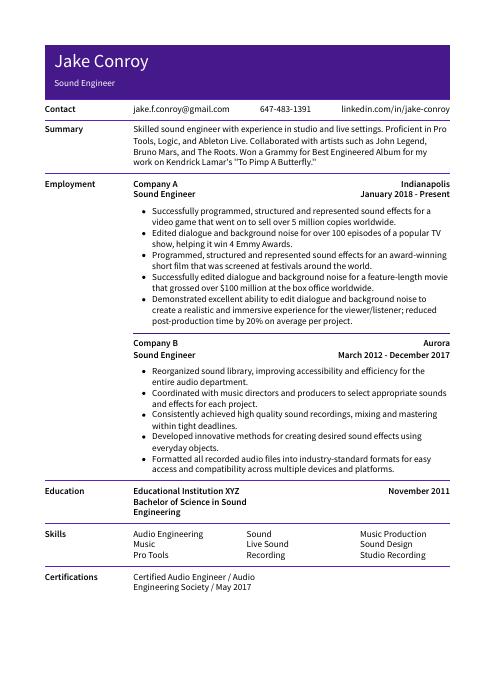 Pika
Pika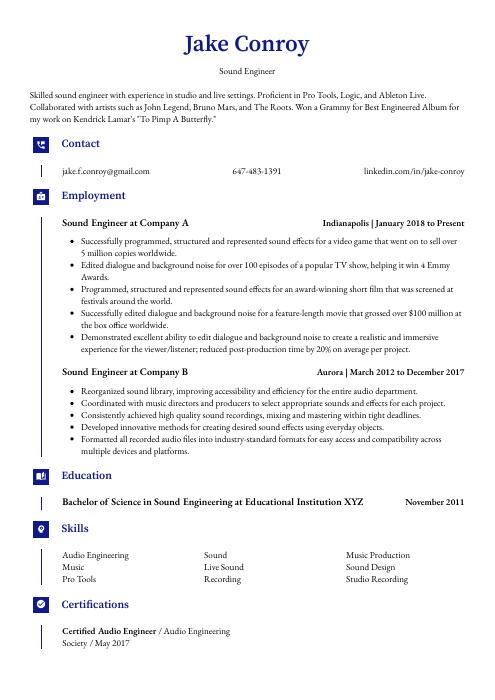 Gharial
Gharial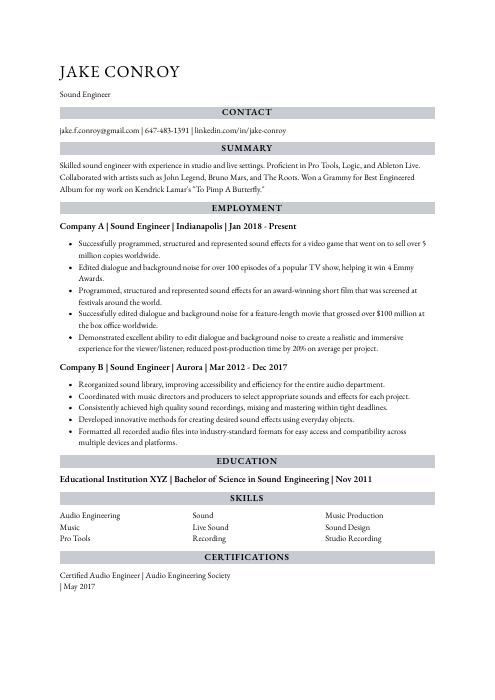 Numbat
Numbat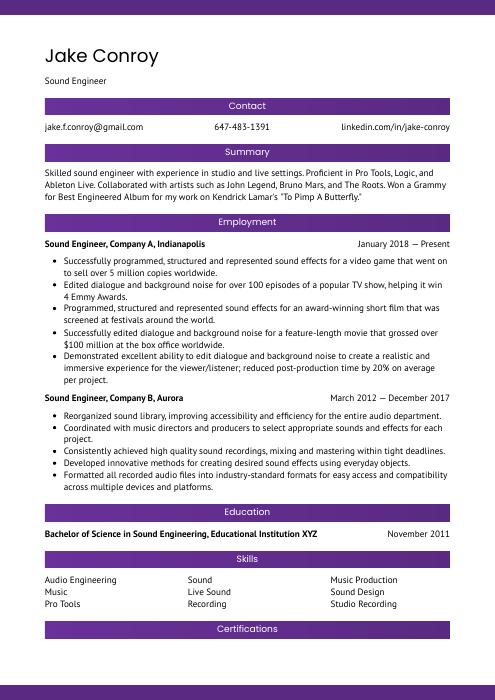 Jerboa
Jerboa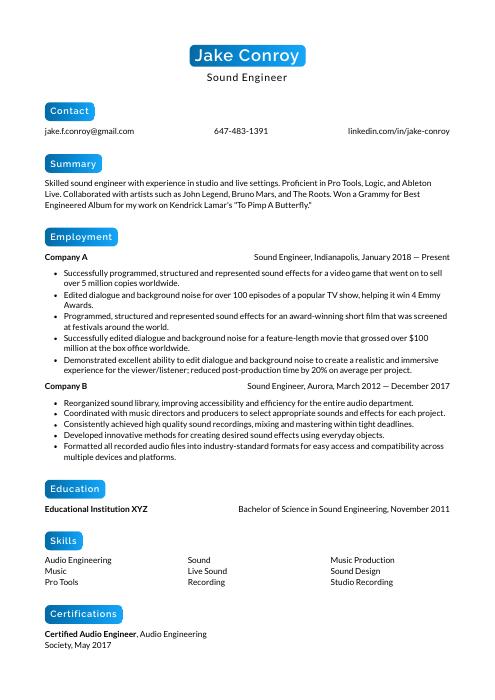 Kinkajou
Kinkajou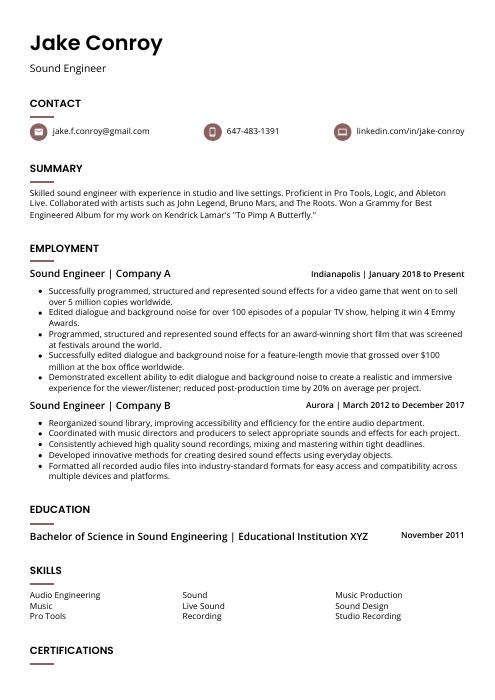 Fossa
Fossa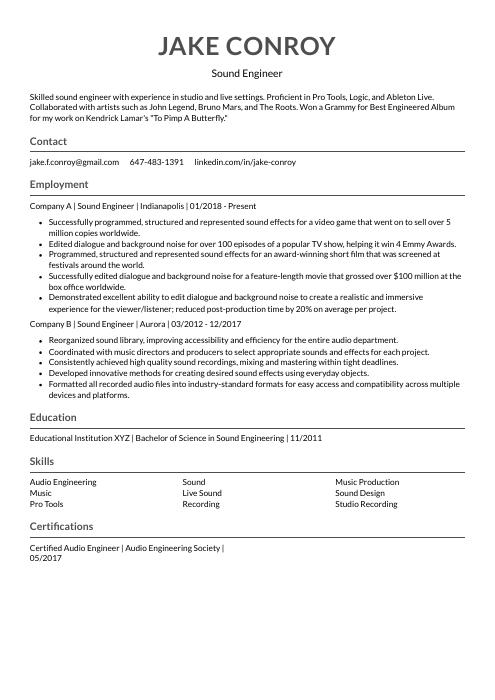 Indri
Indri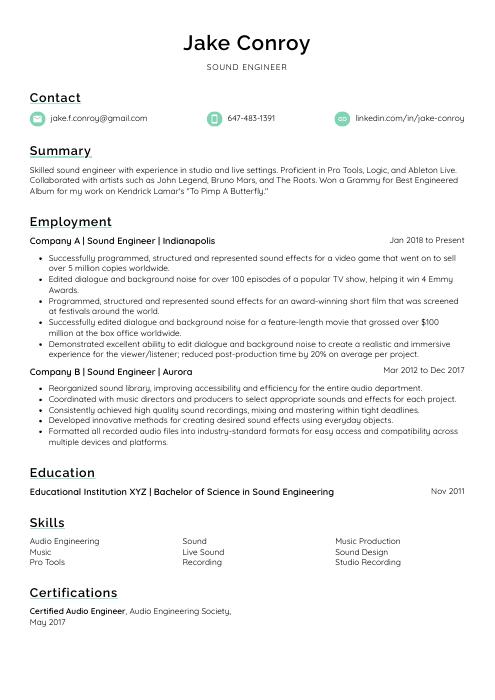 Lorikeet
Lorikeet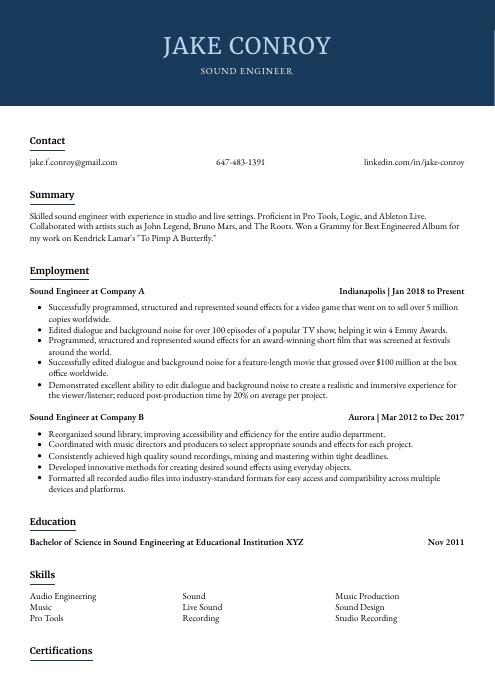 Bonobo
Bonobo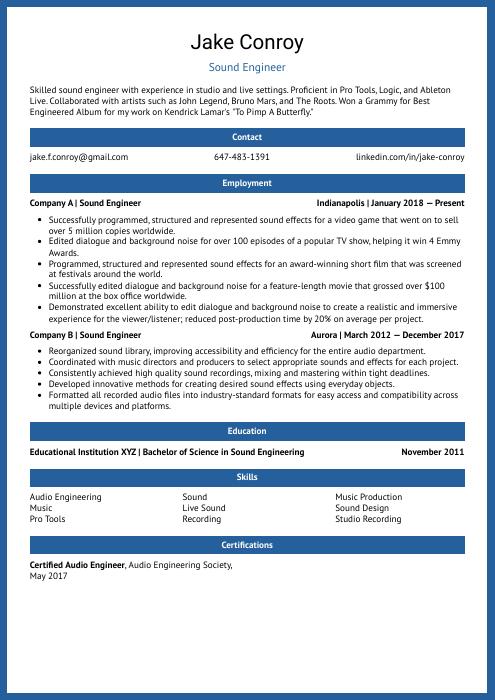 Ocelot
Ocelot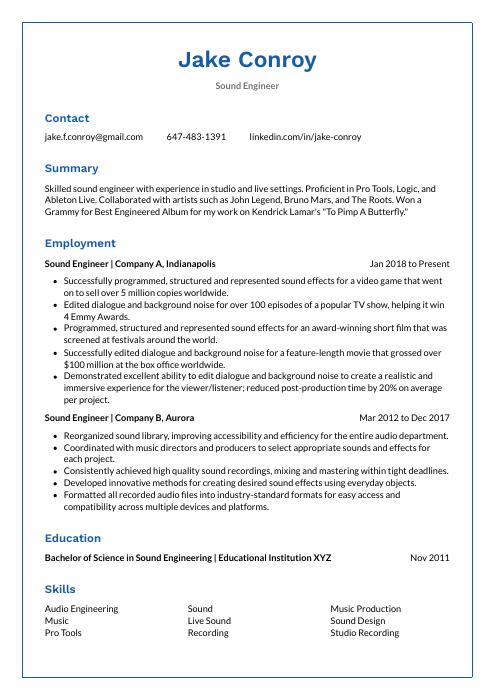 Markhor
Markhor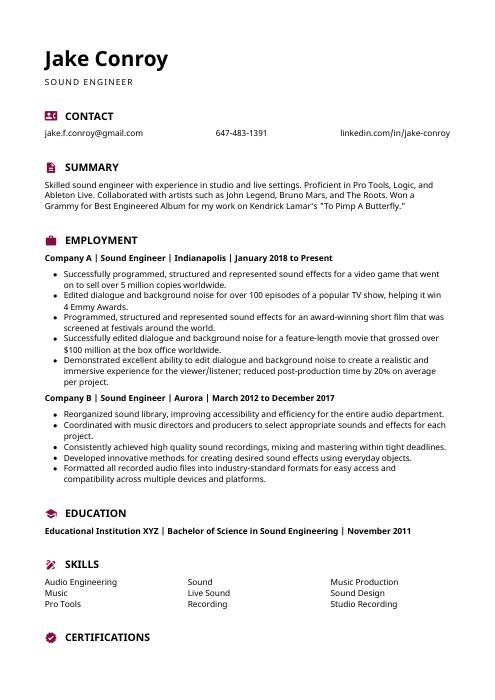 Hoopoe
Hoopoe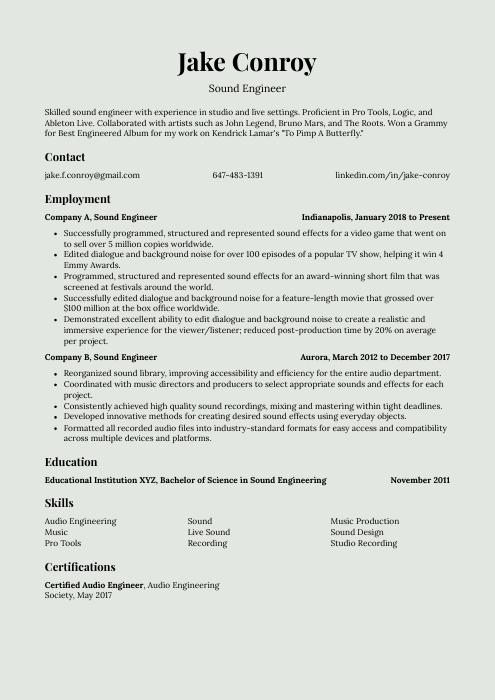 Saola
Saola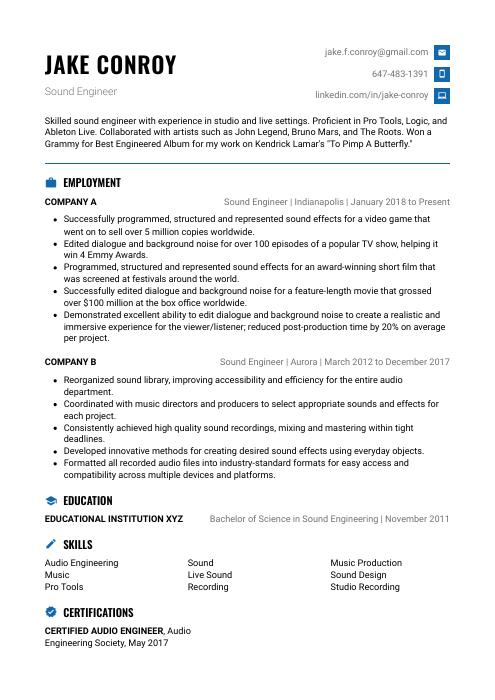 Echidna
Echidna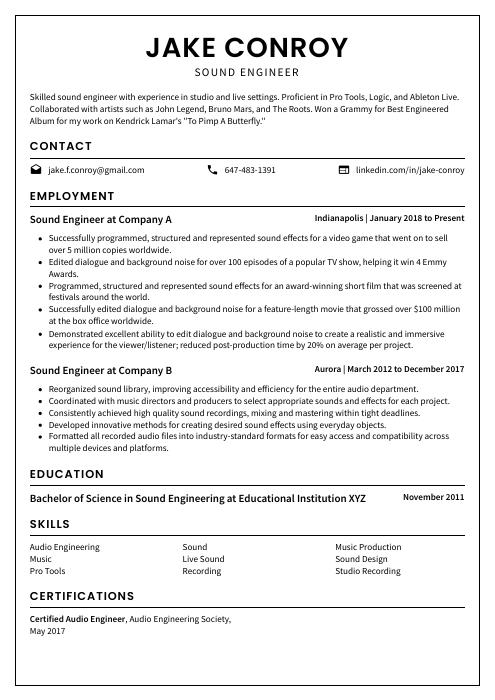 Cormorant
Cormorant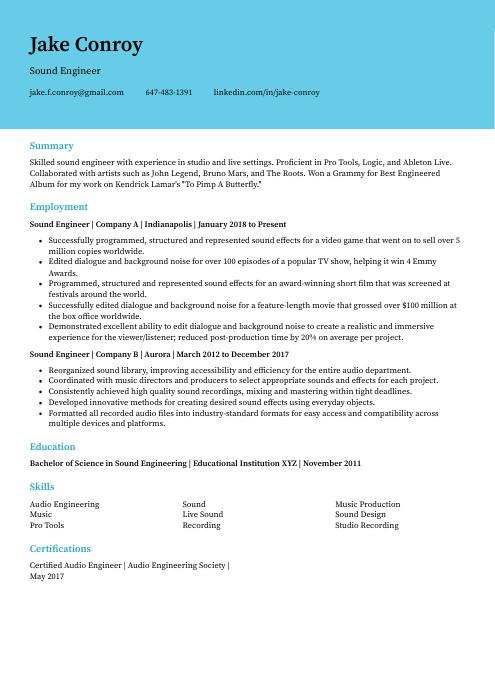 Dugong
Dugong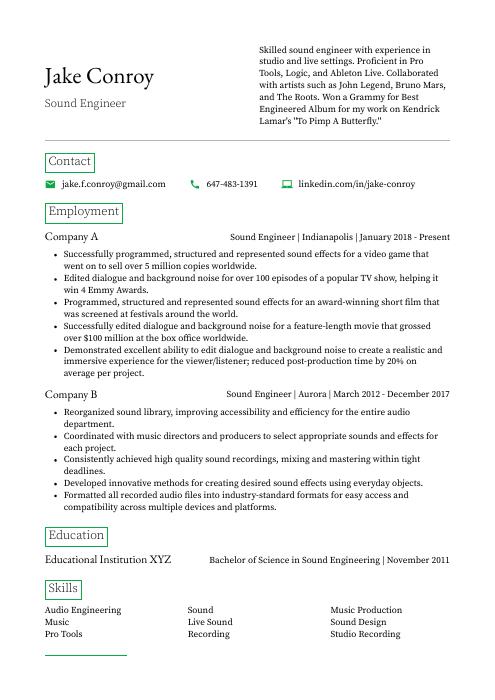 Quokka
Quokka Rezjumei
Rezjumei
